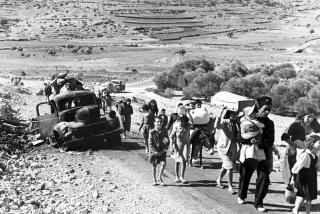Do Something, Bosnian Pleads at Rights Talks : Balkans: Speech moves delegates to pass a resolution demanding an end to genocide.
- Share via
VIENNA — Bosnian Foreign Minister Haris Silajdzic stunned delegates to a world human rights conference meeting here Tuesday with an emotional plea for the international community to do something to save his nation from more bloodshed.
“Bosnia-Herzegovina is everything that human rights are not,” Silajdzic told those attending the United Nations World Conference on Human Rights. “It is a bloodstain on the conscience of the international community.
“I demand on behalf of the participants, on behalf of humanity--because this is a crime against humanity--to take all measures to stop the genocide in at least the one town of Gorazde,” he added. “This is the test. If this is not done, I don’t think there will be any credibility left for any one of us in the international community.”
The delegates present in the main auditorium of the sprawling Vienna Conference Center gave Silajdzic a standing ovation.
His dramatic speech was all the more riveting because it was unexpectedly direct; it broke a cardinal rule of the gathering that speakers avoid naming specific instances of human rights abuses.
It also had the effect of yanking back to reality a human rights meeting that during its opening ceremonies had desperately tried to ignore the unfolding of one of the darkest chapters in post-World War II European history virtually at its doorstep.
Moments later, delegates passed a resolution by a group of Islamic countries demanding that the U.N. Security Council take what it called “the necessary measures to put an end to the genocide in Bosnia-Herzegovina.”
The resolution was at one level purely symbolic. But coming from a global U.N. conference attended by nearly 170 nations and about 1,000 non-governmental organizations, it does carry a degree of weight that would be difficult for the council to ignore.
The Vienna conference is the first global human rights conference in a quarter of a century.
Silajdzic’s statement marked the second dose of reality to hit delegates within the space of a few hours. Earlier Tuesday, former President Jimmy Carter told them that the United Nations had effectively lost control in the field of human rights.
“I hate to say it, but the United Nations is now almost totally incapacitated in dealing with human rights abuses,” he said.
For those who had watched the embarrassing spectacle of the conference having to impose a ban on the Dalai Lama, the Tibetan Nobel Peace Prize winner, because of pressure from China--which has been heavily criticized for its human rights abuses--Carter’s statement merely declared what most of his listeners already knew.
(Using his power as president of the conference, Austrian Foreign Minister Alois Mock brushed aside strenuous Chinese objections late Tuesday and permitted the Dalai Lama to enter the conference building.)
Carter, invited to speak in his role as an eminent human rights activist, described present U.N. structures as too weak to respond meaningfully to abuses.
He urged creation of a U.N. high commissioner for human rights.
“We need one strong person in the United Nations responsible for human rights, who can receive reports and investigate abuses without being strapped down,” Carter said.
Appointment of such a high commissioner, once seen by activists as a primary objective of the conference, is now seen as unlikely because of objections from a large number of Third World countries, some of them major human rights abusers fearful that they might become targets of investigations.
More to Read
Sign up for Essential California
The most important California stories and recommendations in your inbox every morning.
You may occasionally receive promotional content from the Los Angeles Times.













